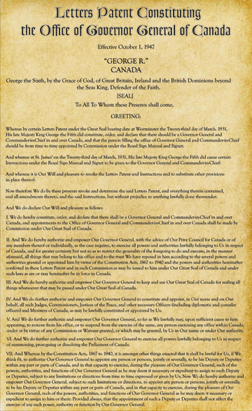(August 20, 2013) A tyrant’s greatest power comes not from the authority he wields or the fear he instills in his people. It comes from the passivity of his victims. Believe it or not, Stephen Harper’s despotism might have been terminated long ago if this country’s high-minded, high-principled, ever-so-reasonable defenders had the courage and the will to do what was necessary.
All this suits Harper just fine because if Canada’s defenders spend all their time and energy in futile speeches and protests he can ignore them at his leisure. After all, he has turned Parliament into a rubber-stamp Reichstag and rendered rational policy-making obsolete. Political protest between elections, therefore, amounts to so much impotent rage. Constitutional protest—ah, that’s another matter. This could bring Harper down because the Constitution is above politics and cannot be ignored, yet few Canadians know this option even exists. Our society is so brainwashed into worshipping elections and disparaging appointed political offices, that if someone tries to discuss this option, he is mocked and the subject is dismissed as outdated and undemocratic. How could a constitutional act be outdated and undemocratic?! Politics (government) serves the Constitution, and this relationship never changes. When a government does violence to the country and its people, the Constitution is supposed to be our protection. To claim otherwise would be irrational, yet I came up against this cognitive infirmity in July when I approached the group Leadnow about spearheading a nationwide petition to demand that Governor General David Johnston exercise his authority to dismiss the Harper government for the sake of the welfare of Canada and Canadians. Here is part of the response I got:
This answer, which may be taken as the standard Canadian view, betrays not only profound ignorance of Canada’s political system of government, but also the psychological passivity that sustains Harper’s tyranny. First, elections do not determine who holds office in Canada. They never have. They merely portray political party popularity. It is the governor general who determines who holds office. After the populace has had its say, he or she issues an invitation to a party leader to form a government. Usually, this invitation goes to the leader of the party that won the most seats, giving the common illusion that the public elects the government. In fact, the governor general may invite any party leader to form a government. After the 2008 general election, for example, when Harper won yet another minority, Governor General Michaëlle Jean could have asked Liberal leader Stéphane Dion to form a government. A precedent for such a decision occurred in 1896 when the Earl of Aberdeen asked Liberal leader Sir Wilfrid Laurier to form a government after Conservative prime minister Sir Charles Tupper failed to win an expected majority. Leadnow’s second error is believing that a disconnect exists between constitutional theory and political practice. If true, Canada would be a self-contradictory, unjust state in which basic rights and freedoms are not universal but subject to the whim of government. Come to think of it, that pretty much sums up Canada under Harper. Does Leadnow really think a constitutional/political disconnect to be normal?! This preposterous view is sadly commonplace, based as it is in our dismissive treatment of the Crown as a vestige of Canada’s colonial past and bereft of any real power. In fact, the governor general has considerable power.
“We do hereby authorize and empower Our Governor General, with the advice of Our Privy Council for Canada or of any members thereof or individually, as the case requires, to exercise all powers and authorities lawfully belonging to Us in respect of Canada…” The powers and authorities set out in Paragraph V are particularly noteworthy: “And We do further authorize and empower Our Governor General, so far as We lawfully may, upon sufficient cause to him appearing, to remove from his office, or to suspend from the exercise of the same, any person exercising any office within Canada, under or by virtue of any Commission or Warrant granted, or which may be granted, by Us in Our name or under Our authority.” (my emphases) Since the prime minister serves at the pleasure of the governor general, David Johnston could summarily dismiss Stephen Harper for sufficient political cause, such as usurping the role of Parliament, lying to Parliament (two counts), acting as an agent of a foreign power (Israel), and generally eviscerating the institutions of Canada in the name of a half-baked totalitarian economic theology. Again, we have a precedent, this time for the Crown to dismiss a majority government and force an election. In November 1834, King William IV dismissed the majority Whig government of Lord Melbourne for being overly zealous in trying to push through reformist legislation over public and Parliamentary objections. The king then asked moderate Conservative Sir Robert Peel to form a minority government. It didn't last long. In April 1835, Melbourne was back in power, and the king acquiesced to his demands. Because Canada inherits British Parliamentary tradition, Johnston should have used William IV’s removal of Melbourne to justify firing Harper before he rammed through his overly zealous corporatist budget. His power to do so comes from Paragraph VI of the Letters: “And We do further authorize and empower Our Governor General to exercise all powers lawfully belonging to Us in respect of summoning, proroguing or dissolving the Parliament of Canada.” (For a compendium of Harper’s abuses see http://harperwatch.wordpress.com) A subsequent NDP government led by Thomas Mulcair would have fallen as swiftly as Peel’s, but at least the public would then have had a chance to vote on the matter!! Demanding that the governor general dismiss a corrupt government is clearly not undemocratic; it is the highest defence of democracy. If Leadnow gathered 300,000, 500,000 or 1 million signatures demanding that Johnston dismiss the Harper government would he dare ignore it? However, there is a snag. Harper nominated Johnston to be governor general, and Johnston was an adviser to Harper in setting up an inquiry into government corruption and aircraft purchases during the late ’80s and early ’90s. Is Johnston compromised by his association with Harper or would he do his duty? That’s what I want to know, but Leadnow can’t be bothered to try. It doesn’t consider it a good tactic. Here’s what it thinks will get results: “The priorities and campaigns of Leadnow.ca are driven by feedback from the almost 300,000 members of the Leadnow.ca Community. Through local gatherings and online surveys, the Leadnow.ca community has decided to focus our long-term efforts on strengthening Canada’s democracy, doing our part to stop runaway climate change, and building a fair economy that reverses the trend of growing inequality.” This is the best it can offer?! The simple logic that a constitutional problem requires a constitutional remedy somehow does not register. None of Leadnow’s pious blather remotely addresses the existential threat that Harper poses to Canada. Why should Leadnow expect Canadians to wait until the next election to rescue their country? What if by some disaster Harper got in again? I can just hear “Follownow” tell its members: “We’ve got to start now to raise money to prepare for the next election, when by golly we’ll teach Harper a lesson!” Canadians have a right to know that they have an option besides twiddling their thumbs while their country is being destroyed. They have a right to demand more from their politicians and activists than cognitive dissonance and political masturbation, all of which suits Stephen Harper just fine.
| ||||||||||||||||||||||||


